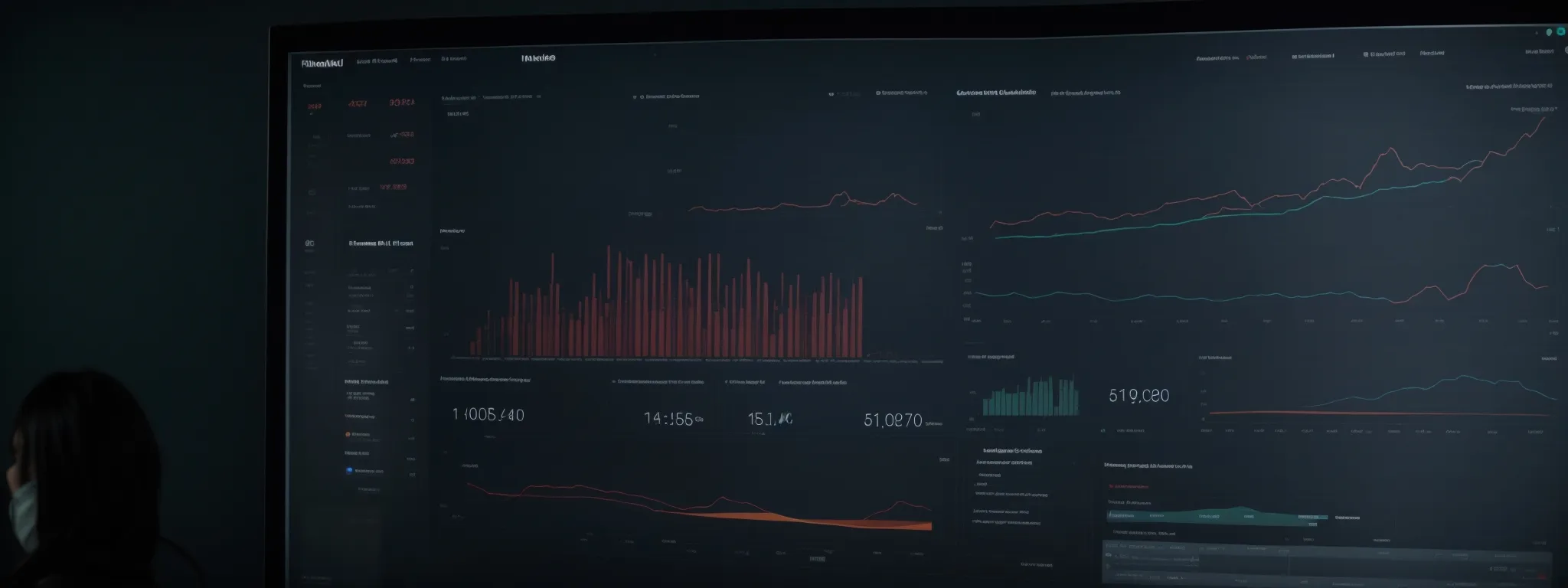The Impact of Backlinks on SEO: Key Importance Explained
Understanding the Role of Backlinks in SEO Success Backlinks serve as endorsements from one web page to another, signaling to search engines the trustworthiness and authority of […]
Understanding the Role of Backlinks in SEO Success
Backlinks serve as endorsements from one web page to another, signaling to search engines the trustworthiness and authority of the recommended site.
As an integral aspect of SEO strategy, these hyperlinks not only drive referral traffic but also fortify your domain’s visibility in SERP rankings.
While the landscape of link building continually evolves, understanding the pivotal role of backlinks remains a cornerstone for enhancing search engine optimization.
In the nuanced dance of increasing a website’s prominence, every backlink counts as a step towards achieving online supremacy.
Keep reading to unveil how effectively curated backlinks can propel your site to the zenith of Google search results.
Key Takeaways
- Backlinks Act as Endorsements by Other Websites Signaling Trust and Authority to Search Engines
- Quality of Backlinks Predominates Over Quantity in Influencing Search Engine Rankings and Domain Authority
- Continuous Backlink Profile Management, Including Audits With Tools Like Search Atlas, Is Essential for SEO Success
- Not All Backlinks Contribute Positively to SEO; Disavowing Harmful Links Can Protect a Website’s Search Engine Standing
- LinkGraph Employs White-Hat SEO Techniques to Build a Network of High-Value Links for Sustainable Long-Term Benefits
Defining Backlinks Within the SEO Landscape

In the intricate world of search engine optimization, backlinks serve as vital conduits, channeling the flow of credibility and authority throughout the digital landscape.
At their core, backlinks connect one web page to another, effectively serving as endorsements in the eyes of prominent search engines.
To truly appreciate their impact on SEO, it’s essential to unravel the tapestry formed by their existence – from dissecting their fundamental nature, examining the mechanics through which they strengthen a website’s standing, to differentiating the diverse array of backlink types.
Each strand plays a pivotal role in weaving a website’s path to prominence in search results, and thus its ultimate success.
Exploring What Backlinks Are
In the realm of search engine optimization, backlinks, also known as inbound or incoming links, are hyperlinks that direct users from one website to another. These links are critical to SEO because they signal to search engines like Google that other websites endorse your content, implying that your site possesses valuable information worthy of citation.
For a business striving for online prominence, securing a robust backlink portfolio is analogous to garnering peer recommendations in a professional network. Each backlink acts like a vote of confidence to the search engine, suggesting that the content on the linked web page holds relevance, authority, and usefulness, which are the cornerstones for climbing the SERP ranks.
Understanding How Backlinks Work
To dissect the mechanics of backlinks, it’s crucial to consider their influence on a site’s search engine ranking. Essentially, when a web page garners backlinks from domains with high authority and relevancy, it receives a boost in credibility, influencing search engines to rank it more favorably.
Backlinks function as part of a broader network, informing search engines about relationships between websites. Analyzing aspects such as the anchor text used and the referring page’s context, search engines can better understand a website’s content and its pertinence to particular queries, thereby affecting the site’s visibility within the search engine results pages (SERPs).
The Different Types of Backlinks
Not all backlinks exert the same influence on search engine optimization, as they can originate from a multitude of sources, each bringing a different level of efficacy to the SEO table. The spectrum includes editorial backlinks where content creators voluntarily link to a resource due to its inherent value, while guest blogging backlinks occur when a writer contributes content to another website and includes links back to their domain.
Equally important are backlinks derived from web directories and press releases, which can bolster SEO efforts by increasing online presence and providing additional pathways for search engines to discover and index web pages. In each case, the quality of the backlink, assessed based on the domain authority and relevancy of the linking site, significantly affects the website’s position in search results and overall SEO fortitude.
The Significance of Backlinks to SEO Performance

In the fabric of SEO success, backlinks are the threads that both strengthen and highlight the integrity of a domain’s authority.
These links are not mere navigational markers; they are perceived as endorsements to search engines, conveying a strong signal of trustworthiness and relevance.
As integral components of search engine algorithms, backlinks help determine a website’s rank, illustrating its significance within a vast network of online information.
The potency of backlinks extends far beyond mere connectivity, as they shape the perception of a domain’s stature, influencing how prominently it appears within the competitive landscape of search results.
How Backlinks Contribute to Domain Authority
Backlinks are among the most influential elements in establishing and enhancing a website’s domain authority. This metric, often leveraged by SEO tools like Search Atlas, reflects a domain’s relevance and strength in its niche, as interpreted by search engine algorithms.
When LinkGraph‘s SEO services facilitate the accrual of high-quality links from trustworthy websites, they incrementally boost the linked domain’s authority. This increase not only heightens the site’s ranking potential but also amplifies its appeal as a credible resource for users and potential customers alike.
Backlinks as Endorsements to Search Engines
In the algorithmic eyes of search engines, each backlink affirms a website’s merit, functioning much like a vote of confidence from the digital community. Search engines, particularly Google, interpret these connections as indicators of a site’s value, which in turn can substantially influence its standing in search results.
Thoroughly weighted by search engines, backlinks from reputable sources are more than mere hyperlinks; they are endorsements that communicate quality, relevance, and trust. When these elements converge, they elevate the profile of a website, granting it a coveted position in the eyes of both algorithms and users:
- Backlinks signal the quality of content, encouraging the search engine to deem a page as valuable.
- Endorsements from industry authorities boost relevance, allowing search engines to match user queries with precision.
- Links from trusted domains enhance the trustworthiness of the target site, upholding the integrity of the search results.
LinkGraph’s SEO services skillfully navigate this intricate web of link-based endorsements, crafting strategies designed to enhance a brand’s visibility and credibility within the digital marketplace.
The Role of Backlinks in Search Engine Algorithms
Backlinks are the cornerstone upon which search engines, including the mammoth Google search engine, assess a site’s relevance and authority. These engines utilize sophisticated algorithms that parse through the mazes of hyperlinks spread across the web, determining which websites should be prioritized in the search results based on the number and quality of their inbound links.
Critical to this is the discernment of each backlink’s context and the authority of its origin, which search engines analyze meticulously. LinkGraph, harnessing its expertise in search engine optimization, adeptly aligns a website’s backlink profile with the stringent criteria set by these algorithms, ensuring the backlinks contribute positively to search engine ranking and overall online visibility.
Identifying the Qualities of Effective Backlinks

In the competitive arena of search engine optimization, distinguishing between high and low-quality links becomes imperative for businesses seeking to solidify their online authority.
The quintessence of a robust SEO strategy lies not just in the quantity of backlinks a domain accrues but in the caliber of these connections.
Thus, discerning the relevance of each backlink to the website’s Content Strategy and its contribution to the brand’s niche is a crucial step.
Moreover, understanding the weight that backlink authority carries in enhancing a website’s credibility is essential, as search engines meticulously calibrate this factor when determining page rank.
With deliberate evaluation and strategic acquisition of backlinks, companies can significantly bolster their search engine visibility and digital dominance.
Distinguishing Between High and Low-Quality Links
In the strategic realm of SEO, discernment between high and low-quality links is paramount, guiding a website’s trajectory towards higher search engine rankings. High-quality backlinks originate from established sites with significant domain authority and a relevant connection to the content they point to, amplifying a webpage’s credibility in the digital sphere. Conversely, links from obscure or non-authoritative domains may carry little weight, sometimes even detracting from a site’s perceived trustworthiness.
LinkGraph not only recognizes the diversity in link quality but prioritizes the integration of high-caliber backlinks, underpinning a company’s SEO framework. By leveraging Search Atlas for meticulous Backlink Analysis, LinkGraph ensures that each link is scrutinized for its potential impact – considering factors such as relevancy, anchor text precision, and the referring domain’s stature, which orchestrate a website’s ascendancy in relevant search results.
The Importance of Relevance in Link Building
In the pursuit of enhancing a website’s authority, the focus must invariably spotlight the pertinence of backlinks to the business’s niche. Relevant linking ensures that the endorsements received resonate with the brand’s content strategy, driving targeted referral traffic that is inherently more valuable to the domain.
LinkGraph expertly navigates the complexities of link relevancy, integrating backlinks that not only confer authority but also align perfectly with the thematic core of the client’s site. This alignment is paramount for signaling to search engines the contextual integrity of the domain, which is indispensable for achieving meaningful search engine ranking improvements.
Recognizing the Value of Backlink Authority
Grasping the concept of backlink authority is akin to understanding the currency of the internet’s trust economy. A backlink from a high-authority site serves as a potent endorsement, suggesting to search engines that the linked content is not only relevant but also possesses a distinguished level of expertise and trustworthiness.
This clout is not bestowed lightly; search engine algorithms critically evaluate the authority of a linking domain. High authority backlinks are instrumental in propelling a webpage’s prominence, thus influencing its ability to surface at the top of Google search engine results:
- A link from a domain with substantial authority can boost the linked page’s own authority, enhancing its search engine ranking.
- Such backlinks serve as a hallmark of quality content, leading to increased referral traffic and visibility to new audience segments.
Strategies for Acquiring High-Quality Backlinks

For businesses aiming to secure a prominent position in the vast digital marketplace, the strategic acquisition of high-quality backlinks is non-negotiable.
Embarking on this endeavor requires a multifaceted approach, with emphasis on content marketing that resonates with both readers and website owners, the finesse of outreach that fosters robust relationships within the industry, and the dynamic utilization of social media platforms as fertile ground for backlink opportunities.
Each of these tactics coalesces to form a comprehensive backlink strategy, augmenting referral traffic and domain authority, thereby solidifying the brand’s standing in the competitive hierarchy of search engine results.
Content Marketing as a Tool for Earning Backlinks
Content marketing emerges as a potent leveraging point for earning backlinks, with the creation of compelling, informative content that naturally attracts backlinks being a primary goal. By investing in quality blog posts, guides, and informative webpages, LinkGraph aids businesses in establishing themselves as thought leaders, enticing other sites to link back to their superior resources.
LinkGraph’s strategic approach to content strategy envisions beyond mere production; it encompasses content promotion through various channels, maximizing visibility and increasing the chance of earning valuable backlinks. This dual-faceted strategy ensures clients not only produce content worth linking to but also that their content is discovered by authoritative domains looking to enhance their own user offerings.
Techniques for Outreach and Building Relationships
Reaching out to peers in the industry is a cornerstone of building a strong backlink profile. LinkGraph harnesses the power of relationship building by engaging with influencers, industry leaders, and content creators, fostering a network of connections that opens doors to Guest Posting opportunities and mutual content sharing, all of which contribute significantly to SEO success.
Communication and consistent engagement form the lifeblood of meaningful relationships in the digital SEO landscape. LinkGraph’s team of experts prioritizes personalized outreach that resonates with the recipient’s interests and goals, initiates dialogues that form the basis for ongoing partnerships, and paves the way for high-quality backlinks that bolster both presence and search engine ranking.
Leveraging Social Media for Backlink Opportunities
In a world increasingly interconnected by social media, these platforms emerge as a fertile field for sowing backlink opportunities. LinkGraph navigates this terrain by engaging audiences with shareable content that drives visibility and encourages the organic spread of hyperlinks through social channels.
The adept use of social media by LinkGraph extends to fostering conversations and community engagement around a brand’s content, which enhances the likelihood of obtaining backlinks as the content gains traction and recognition among industry stakeholders and enthusiasts.
Common Misconceptions About Backlinks in SEO

In the intricate pursuit of SEO excellence, misconceptions concerning the nature and impact of backlinks often lead businesses astray.
Amidst the clamor for enhanced search engine rankings, some hold fast to the idea that accumulating a vast number of links trumps the strategy of curating quality connections, falling prey to the allure of quick, black-hat link building tactics.
This introductory discussion will address such fallacies by elucidating why a discerning approach to backlink acquisition is imperative, scrutinize the risks inherent in unethical link building practices, and emphasize the nuanced truth that not all backlinks contribute positively to a website’s SEO profile.
Debunking Myths Surrounding Link Quantity Over Quality
The conversation around backlinks has long been mired in the myth that quantity outstrips quality; however, seasoned SEO professionals like those at LinkGraph understand the landscape better. They recognize that a few well-placed links from authoritative and relevant websites can have a far greater impact on search engine rankings than a multitude of low-quality links.
As a guiding principle, LinkGraph champions the approach that quality backlinks are intrinsic to a sustainable and effective SEO strategy: a sentiment echoed by reputable SEO backlinks doctrines and white-hat methodologies. Building a network of high-value links bolsters a brand’s credibility and commands respect from both search engines and customers.
| Aspect | Quality Focused | Quantity Focused |
|---|---|---|
| Search Engine Assessment | Preferred due to high relevance and authority of links | Often disregarded due to spam-like characteristics of numerous low-quality links |
| Long-term SEO Benefits | Sustainable improvement in rankings and domain authority | Possibility of penalties and reduction in search visibility |
| User Trust | Increased due to endorsements from credible sources | Eroded by association with spam or irrelevant websites |
The Risks of Black-Hat Link Building Techniques
Engaging in black-hat link building techniques presents a considerable gamble that threatens the very foundation of a website’s SEO strategy. LinkGraph conveys the urgency of steering clear from such risky practices, as they can provoke punitive actions from search engines, including severe penalties that may diminish a site’s search engine visibility and credibility.
Manipulating the number of backlinks through deceptive schemes such as link farms or paid links does more harm than good by undermining a site’s integrity. LinkGraph’s expertise lies in cultivating organic growth through white-hat methods, safeguarding clients against the repercussions that black-hat tactics incur, such as damaging the clients’ reputation and long-term ranking prospects.
Why Not All Backlinks May Benefit Your SEO
Not all backlinks are created equal in the intricate dance of SEO dynamics. A link from a poorly regarded or irrelevant site can be detrimental rather than beneficial, signaling to search engines a lack of discernment or quality in association. Consequently, such misaligned backlinks do not aid but may indeed undermine a website’s attempts to rise in search engine rankings.
Understanding the diversity and impact of each backlink is essential for refining an SEO strategy. Links that are considered low-quality, such as those from spammy or non-reputable sources, can attract the scrutiny of search engine algorithms resulting in adverse effects. To maintain the health of a website’s backlink profile, LinkGraph focuses on high-quality links that align with the site’s content and contribute positively toward achieving SEO objectives.
| Backlink Type | SEO Impact |
|---|---|
| High-Quality from Reputable Sources | Enhances search engine rankings and domain authority. |
| Low-Quality or Spammy Links | Potentially damages rankings and could lead to search engine penalties. |
Monitoring and Managing Your Backlink Profile

In the dynamic realm of SEO, the management of one’s backlink profile is just as crucial as the acquisition of new links.
A meticulously cultivated backlink portfolio serves as the backbone of search engine ranking success, making tracking and auditing these links a task of paramount importance.
Professionals adept in the art of SEO employ advanced tools to meticulously monitor backlinks, ensuring that each contributes positively to the website’s search engine standing.
Navigating this multifaceted process requires a keen eye for detail to identify and mitigate potentially harmful links through strategies such as disavowal, reinforcing the integrity of the backlink profile.
With LinkGraph’s Search Atlas at the helm, robust monitoring and strategic management coalesce to transform a website’s backlink profile into a solid foundation for enduring SEO efficacy.
Tools for Tracking Your Backlink Portfolio
In the vanguard of SEO maintenance, tracking tools play an indispensible role, equipping website owners with the insights needed to monitor backlink profiles meticulously. LinkGraph’s Search Atlas stands out as a premier utility, offering comprehensive backlink analysis that arms businesses with actionable data to sustain and optimize their search engine standing.
Equipped with advanced features, Search Atlas allows clients to scrutinize various metrics of backlinks, including anchor text usage, domain authority of linking sites, and the relevancy of incoming links to their content strategy. These metrics serve as critical indicators of a backlink’s value to a page’s SEO performance:
- Anchor text analysis informs the thematic relevance of links and potential keyword associations.
- Domain authority evaluations help gauge the strength of endorsements each backlink carries.
- Relevancy assessments ensure that the backlink portfolio aligns with the brand’s overarching content narrative.
How to Conduct a Backlink Audit
Conducting a backlink audit encapsulates a methodical examination of a website’s inbound link profile, aimed at evaluating the health and efficacy of the links in bolstering SEO rankings. This process typically begins with the use of advanced analytics tools such as LinkGraph’s Search Atlas, which provides deep dives into backlink sources, quality, and configurations to uncover any negative impacts that might hinder a website’s search engine reputation.
The second phase of a backlink audit involves a thorough assessment of the anchor texts, frequency of links from various domains, and the overall alignment between the backlinks and the website’s content and SEO strategy. This critical review informs strategists at LinkGraph about necessary revisions or the potential to discard detrimental links, ensuring clients maintain an optimal and efficacious digital footprint.
Managing and Disavowing Unwanted Backlinks
Managing an SEO profile demands vigilance against unwanted backlinks, which can tarnish a website’s reputation with search engines. Through carefully crafted disavowal requests, LinkGraph’s expert team assists clients in signaling to Google which links to ignore, safeguarding the site’s standing and ensuring that only beneficial backlinks remain active contributors to its SEO success.
Disavowing links is a precise endeavor, akin to surgical removal in the medical field: it requires pinpoint accuracy to ensure the health of the website’s overall backlink profile. LinkGraph provides clients with strategic guidance on when and how to disavow backlinks, ensuring this decisive action strengthens the client’s search engine positioning, rather than inadvertently causing harm:
| Action | Purpose | Impact on SEO |
|---|---|---|
| Disavowing Links | Communicate to search engines which backlinks should not influence the site’s SEO. | Minimizes negative ranking factors from low-quality or spammy links. |
| Reviewing Backlink Profiles | Identify and analyze unwanted or harmful backlinks to the website. | Ensures maintenance of a high-quality backlink profile for optimal SEO performance. |
Frequently Asked Questions
How do backlinks impact search engine ranking and organic traffic to a website?
Backlinks serve as endorsements for a web page, signaling to search engines the trustworthiness and relevancy of the content, thereby potentially increasing the domain authority and improving search engine rankings. Elevated search rankings can result in enhanced visibility, leading to a surge in organic traffic as more users discover the web page through their search queries.
What are the key qualities to consider when evaluating the effectiveness of backlinks for SEO?
Evaluating the effectiveness of backlinks hinges on their relevance and the domain authority of the linking site, as both elements significantly influence a web page’s rank in search results. Additionally, the trustworthiness of the site and the placement and anchor text of the hyperlink are factors that search engines use to determine the value of a backlink.
How can businesses acquire high-quality backlinks that improve their search engine visibility?
Businesses can acquire quality backlinks that bolster their search engine visibility through strategic outreach efforts such as guest posting, which involves creating valuable content for other reputable websites with links back to their own site. Another effective approach includes leveraging LinkGraph’s White Label Link Building services; these services help businesses secure authoritative backlinks that align with search engine optimization best practices.
What are some common misconceptions or myths surrounding the role of backlinks in SEO?
One pervasive misconception is that all backlinks, regardless of their origin, benefit search engine optimization equally; in reality, the quality and relevance of the linking domain carry significant weight in determining the impact on search engine rankings. Another myth is that large quantities of backlinks can compensate for poor-quality content, when in fact, engaging, high-quality content is foundational to earning valuable, authoritative backlinks that truly enhance SEO efforts.
What tools and strategies can be used to monitor and manage a website’s backlink profile effectively?
Effective management of a website’s backlink profile can be achieved with robust tools like LinkGraph’s Search Atlas, which offers comprehensive backlink analysis that helps website owners identify valuable links and uncover potentially harmful ones. Strategic methods include regular audits, monitoring domain authority, and assessing the relevancy and trustworthiness of linking pages to maintain a healthy and SEO-optimized backlink profile.
Conclusion
Understanding the role of backlinks in SEO success is crucial for any business looking to enhance its online presence.
High-quality backlinks act as endorsements from other reputable websites, signaling to search engines that a webpage is valuable, relevant, and trustworthy.
These links contribute significantly to a site’s domain authority and search ranking.
Employing strategic approaches to acquire and manage a backlink portfolio, like creating compelling content and forging industry relationships, is vital.
Tools like LinkGraph’s Search Atlas are indispensable for tracking and auditing backlinks, ensuring they positively impact SEO.
It’s important to prioritize link quality over quantity and to avoid black-hat techniques that can damage a website’s reputation.
Regularly auditing and disavowing harmful backlinks safeguard a site’s search engine standing.
In summary, a nuanced and vigilant approach to backlinks can substantially improve a website’s visibility and elevate its SEO success.















































































